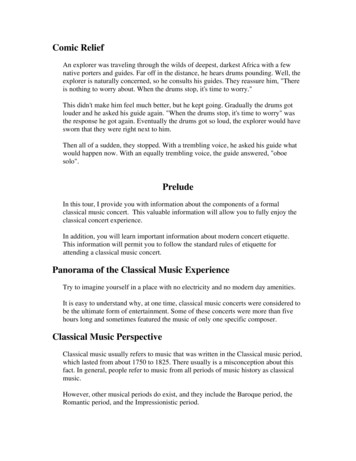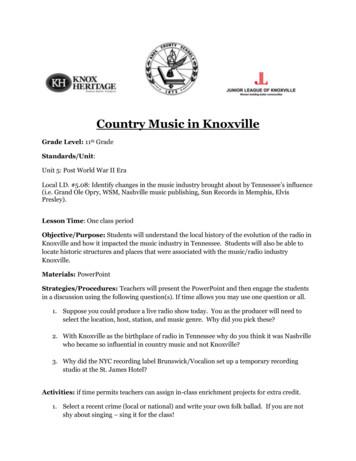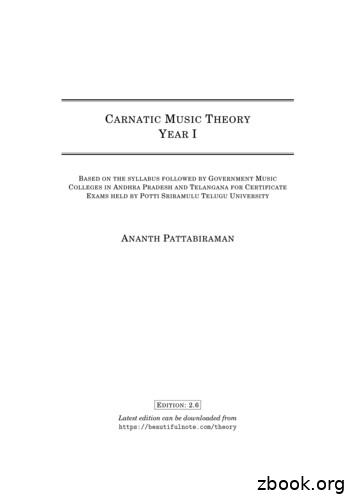STUDENT HANDBOOK Department Of Music
STUDENT HANDBOOKDepartment of Music2020-2021EASTERN WASHINGTON UNIVERSITY
Table of ContentsContact Information . 3Emergency Numbers . 3Building and Facility Use . 4Building Security . 4Practice Rooms . 4Recital Hall . 4University-Owned Instruments, Uniforms, and Equipment . 4Health and Safety Procedures . 4Ensembles at EWU . 5Performance Policies . 6Major Ensemble Requirements. 6Applied Music Instruction On Instruments and Voice . 6Jury Procedures . 6Upper Division Standing . 6Lesson Registration Number System. 6Missed Lessons . 7Change of Studio . 7Student Recitals and Convocation Performances . 7Academic Information . 7Entrance and General Requirements for All Students . 8Major Declarations . 8Advising . 8Minimum Grade Standards . 9Piano Placement and Proficiency . 9String and Percussion Techniques . 10Transfer Students . 10Senior Capstone . 10Scholarships . -------------------10Convocation and Recital Attendance Policy and Requirements . 11Student Complaints and Grade Appeals . 12Music Degree Programs & Course Lists . 12Recital Policies and Procedures . 13Recital Hall Reservation Procedures . 32Recital Types . 33Approvals and Forms . 15Pre-Recital Jury . 34Additional Student Responsibilities . 35Degree Recital cital Time Table/Checklist . 36Piano Use Policies. 36Recital Program Template . 422
Contact InformationDepartment AddressEWU Music Department119 Music BuildingCheney, WA 99004Music Department main office phone509-359-2241Music Department websitehttp://www.ewu.edu/cale/programs/musicVisit this site for prospective and current student information (including this handbook),recital hall and classroom reservation procedures/calendar, forms, course catalogues, eventscalendar, etc.EWU College of Arts, Letters, and Education (CALE)Interim Dean: Dr. Pete PorterAddress: Patterson 343Phone: (509) 359-2328Fax: (509) 359-4822Website: https://www.ewu.edu/caleRegistrar’s Office:359-2321Financial Aid Office:359-2314EWU Graduate and Undergraduate ency NumbersIn any emergencyCampus Police (non emergency)Cheney Police (non emergency)911509-359-7676509-535-9233EWU Student Support and Advocacy509-359-7924EWU Counseling and Psychological Services (CAPS)509-359-2366CAPS supports and promotes the emotional, intellectual, physical and spiritual health andwellness of students. It provides individual and group counseling, crisis intervention, andoutreach programming and consultation services to students.Spokane 24-hour rape crisis lineOther emergency numbers available at:509-624-RAPE ers3
Building and Facility UseBuilding Security. As of this date and until further notice, the Music Building is accessible onlyby proxy card (student/faculty ID card). Go to the Access Control Web site to find the Prox.Card application form tenance/access-control/).Fill out the top half and sent to chegney@ewu.edu. She will then fill out the rest of the form andsend it to Access Control.Practice Rooms. Practice rooms are available for use except when restricted for health reasons,piano maintenance, or repairs. These rooms are available on a first-come first-served basis, andstudents must follow the protocols posted outside every practice room. Students are required tosign their name clearly on the schedule sheet posted on each door when using a room. Access tolocked practice rooms is assigned by the percussion and piano instructors. Students are expectedto treat all music equipment with respect. Pianos are to remain where the piano technician hasplaced them. Report any damaged equipment to the department secretary in room 119 and to thepiano technician.Classrooms may be used for practice, with no more than 4 students, by requesting a day/timethrough the scheduling process. Email your request toEWUMusicRoomScheduling@gmail.com. Hallways, galleries, storage areas, etc. may not beused for practice. The recital hall may not be used as a practice room and students must be listedon the recital hall calendar in order to have approved rehearsal time . Authorized use (scheduledthrough the music office secretary) is the only time students should be on the stage. Pleaserequest Recital Hall time as you would for a recital (see below, p. 11).Recital Hall. Use of the recital hall is restricted to approved classes, rehearsals and eventsscheduled on the online calendar found at https://sites.ewu.edu/music/events/. Only thedepartment secretary is authorized to schedule the recital hall. Should your event require the useof a piano, there are two Steinway concert grands available. Permission from Dr. Graves isrequired before using these instruments. Please read the Piano Use Policy, p. 16. Afterrehearsals and performances, all faculty and students are expected to clear the recital hallstage, return all equipment to the appropriate location, put protective covers on pianos,turn off lights, etc.University-Owned Instruments, Uniforms, and Equipment. University instruments may onlybe used with the permission of the appropriate instructor. All instruments must be checked outunder the supervision of the Instrument Room Attendant following the EWU Instrument CheckOut Procedure (form available outside the Music Office, room 119). Report loss or neededrepairs immediately to the department secretary. Students are responsible for loss or damage toany of these items. Grades will be held until items are returned. The student will be charged foritems that are not returned.Health and Safety ProceduresDue to Covid19, there are new and temporary health guidelines that have addedrestrictions to Music building access. Students, faculty, and staff are required tosubmit an online attestation survey before coming to campus. The doors to thebuilding can only be opened with prox. cards.4
Information and updates can be found 020.pdf Students are required to wear masks whenever they are inside university buildings unless theyare inside their own dorm rooms or involved in strenuous exercise in a university athletic orrecreational facility. If a student is not wearing a mask or practicing social distancing, you canremind them of the requirements and, if necessary, report the incident to Student Rights Attestation and fo/EagleCard and Updates sicians are susceptible to a wide range of injuries due to extended and repetitive use of thebody and exposure to high sound levels. They are also susceptible to psychological stressthrough the demands of the field. Students are urged to familiarize themselves with injury andstress prevention approaches and to implement them as appropriate. Students are encouraged towear noise reduction devices during rehearsals and performances as appropriate. Students arealso encouraged to take advantage of the services available to them from William Conable, aworld-renowned teacher of the Alexander Technique who facilitates this course every term. Inthe case of practicing and performance-related injury, students should seek immediate medicalconsultation and report conditions to their applied instructors, ensemble directors, anddepartment chair. Any necessary accommodations will be addressed by the chair on a case-bycase basis in consultation with the student and qualified faculty.All safety and building-related health concerns should be reported to the department chair andappropriate staff as soon as concerns are apparent. In an emergency, call 911; other importantcontact information is given on p. 3.Ensembles at EWUMany opportunities are available to perform in EWU’s music ensembles for course credit.Contact ensemble directors for audition requirements and dates. More specific information oneach ensemble is available online.Symphony OrchestraBands: Wind Ensemble, Symphonic Band, Eagle Marching Band, Pep Band (Code Red).Choirs: Symphonic Choir, Concert Choir, Collegians (vocal jazz),Opera WorkshopJazz: Jazz Ensemble (I), Repertory Jazz Ensemble (II), Jazz Combos5
Chamber Groups: Percussion Ensemble, Chamber Ensembles (woodwind and strings),Saxophone Quartet, Brass Ensembles, Guitar Ensemble, Jazz and Pop Combos.Ensemble DirectorsDr. Don Goodwin, BandsDr. John Marshall, OrchestraMs. Kristina Ploeger-Hekmatpanah, ChoirsMr. Scott Rednour, OperaMs. Jenny Kellogg, Jazz EnsemblesPerformance PoliciesMajor Ensemble Requirements: All full and part-time music majors (including postbaccalaureate students seeking certification) are required to participate in the major ensembleappropriate to their principal area of performance each quarter of their university program(Music Education majors are exempt during the quarter in which they are student teaching).1.2.3.4.Major ensembles and course numbers are:A. MUSE 320-322 Band - Required for all woodwind, brass, and percussion majors.Marching Band is required fall quarter, except for students earning only a musicperformance degree (including jazz performance) who have passed into upperdivision standing.B. MUSE 330 Orchestra - Required for all string majors (including harp).C. MUSE 340 Symphonic Choir, or MUSE 341, Concert Choir - Required for allvoice majorsMajors in Piano Performance may substitute one year (3 quarters) of Piano Ensemble(MUSE 368/568) in lieu of one year of a major ensemble.Music Education majors are required to participate for one quarter in a major ensembleoutside their principle performance area.Winds and percussion students in the Wind Ensemble may also perform with theOrchestra, based on approval from the orchestra director and the appropriate appliedinstructor. Rehearsal times of the two ensembles do not conflict.Applied Music Instruction (Lessons) on Instruments and VoiceStudents pursuing a major in music are required to study their chosen instrument/voice with anEWU instructor each quarter of their degree program (except for Music Education majors duringthe quarter of their student teaching assignment). Every student (majors, minors, and nonmajors) who is accepted for private applied music study is required to participate in a majorensemble.Jury Procedures: At the conclusion of each quarter of applied study, all students (undergraduateand graduate, majors, minors, and non-majors) are required to perform before, and be evaluatedby, a panel of music faculty. Performances for juries are viewed not only as a quarterly finalexam, but also as an important part of each student’s professional development. The environmentof jury performance is similar to that often encountered by musicians at professional auditions ormusic competitions. Since jury preparation is an important long-range process, it is critical that6
students take responsibility for planning strategy, and understanding standards and expectations,during each quarter of study with their applied teachers.Upper Division Standing: Undergraduate students must acquire approval from a jury panelbefore enrolling for advanced levels of instruction in applied music (MUSC 308, 340, or higher).Transfer students will be evaluated for upper division standing during their audition. Studentsshould consult their applied teachers for information about upper division jury requirements.Applied Lesson Registration Numbering System and DegreesMUSC 108, 208, 308, 408 (1 credit, ½ hour lesson): BME, BA Music, BM CompositionMUSC 140, 240, 340, 440 (2 credits, 1 hour lesson): BM PerformanceMUSC 170, 371 (1 credit, ½ hour lesson) for BA in Musical TheatreNote: All 300 and 400 levels require approval with Upper Division StandingMUSC 529 (1 credit, ½ hour lesson): Graduate students of all emphases except PerformanceMUSC 530 (2 credits, 1 hour lesson): Graduate students with Performance emphasisNote: In some cases, composers seeking a BA degree will be permitted to take 208-level lessonsin their senior year, as long as they have taken applied lessons on more than one instrument andhave approval from the department chair and pre-recital committee.Missed Lessons: The department will offer 10 lessons to all applied students in any givenquarter. Lessons canceled by the student will not be made up. Lessons missed by the instructorwill be made up within the quarter. Instructors will make every effort to reschedule lessonsmissed due to national holidays that occur during the regular quarter.Change of Studio: In applied areas with multiple instructors, if students desire to change studiothey are required to obtain the approval of their current teacher, proposed teacher, and the musicdepartment chair before making any changes.Student Recitals and Convocation Performances: You must have your instructor’s permissionto perform on recitals and convocations. For recitals, you must follow the guidelines found on p.11 of this handbook. Forms must be submitted to the music office and signed by your appliedmusic teacher at least one month before your recital or 2 weeks before convocation.Academic InformationThe EWU Catalog (https://catalog.ewu.edu/) is the primary source for academic programs andrequirements. The following information is supplemental. Many required music courses areoffered sequentially, on alternate years, or as demand necessitates. Consult the Course7
Announcement (published quarterly) and your advisor about course offerings for any givenquarter.Academic calendar: lendar/The EWU Music Department is accredited by the National Association of Schools of Music.Entrance and General Requirements for All Students:1. In addition to being accepted by the university, students must also audition to be acceptedinto the music program. Audition guidelines are available outside the music office andonline.2. Students must pass first-year Music Theory and Sight-singing (MUSC 101-106) with a Cor higher in order to take second-year Music Theory and Sight-singing (MUSC 201-205)and Music History (MUSC 250-252).3. All students must pass the Piano Proficiency Exam as a prerequisite to MUSC 201. PPEexams are taken at the conclusion of MUSC 122, Spring quarter or MUSC 126, Fallquarter. See p. 8.4. All students (except for Music Education majors who are student teaching) must sign upfor MUSC 110 all quarters of their program. See p.10.Major Declaration: It is vital that students officially declare their music major as soon aspossible in order to receive professional advising in their program, and remain in curricularsequence in order to graduate in a timely manner. To be eligible to declare, students mustaudition and be accepted into a specific degree program in the Music Department. Once theseeligibility requirements are met, students should obtain and complete a declaration form(available at rms/ or via the Music DepartmentOffice, room 119). The form must be signed by a music faculty advisor and returned to theMusic Department secretary for processing.Related Li
Health and Safety Procedures Due to Covid19, there are new and temporary health guidelines that have added restrictions to Music building access. Students, faculty, and staff are required to submit an online a
2 southwestern assemblies of god university student handbook 3 2021-2022 student handbook. 2 southwestern assemblies of god university student handbook 3 student handbook message from the president . steven watson head women's softball coach. 8 southwestern assemblies of god university student handbook 9 mark walker director, campus software
Wartburg College Music Department 2 Student Handbook 2022-2023 . Welcome! We are pleased to welcome you to Wartburg College as you pursue the study and performance of music. As we begin the 2022-2023 academic year, we would like to extend our personal welcome to the Music Department and the Bachman Fine Arts Center. The
complete music theory, ear training and s ight singing curriculum, a comprehensive music history curriculum, along with general education requirements. Music Program Description The Associate in Fine Arts in Music degree is a focused, two-year study of music that includes music
Classical Music Perspective Classical music usually refers to music that was written in the Classical music period, which lasted from about 1750 to 1825. There usually is a misconception about this fact. In general, people refer to music from all periods of music history as classical music. However, other musical periods do exist, and they .
Country Music is a blend of popular music originally found in the Southern United States and the Appalachian Mountains. It has roots in traditional folk music, Celtic music, gospel music and old-time music and it evolved rapidly in the 1920’s. Early history Immigrants to the Southern Appalachian Mountains of North America brought the music and
geetham, i.e., the union of music and words (swaram and sahityam). Geethams are the simplest of melodies. The term geetham literally means a song, but in Carnatic music it signifies a particular type of composition. The music of the geetham is simple melodic extension of the raga in which it is composed. Its tempo is uniform.File Size: 433KBPage Count: 18Explore furtherCertificate Theory Syllabus – Carnatic Music Examscarnaticmusicexams.inCarnatic Music Theory Notes - Carnatic Academycarnaticacademy.weebly.comSouth Indian Classical (Carnatic) Music Basics (Sarali .www.shivkumar.orgCARNATIC MUSIC (VOCAL) THEORY (Code No. 031) Syllabus for .cdn.aglasem.comkarnATik Beginners' Lessons Notationwww.karnatik.comRecommended to you b
Music is an important part of school life 1. Students enjoy making music and many continue to play music throughout their lives after a good music education in school 2. Music programs can bring the school community together, raise the school’s profile in the community, and boost morale Music education can have benefits to other areas of learning
A 9 Another day in Paradise Popular Music B cont. *1 A joyous greeting 359 Alfie Popular Music 33 Bohemian Rhapsody Popular Music 1 A nightingale sang Popular Music 370 All by myself Popular Music 34 Boom bang a bang Popular Music 2 Abba selection Selection 371 All about that bass (Tuba) Popular Music 34 Born free Film Music 2 Abba Gold Selection B * Boy























